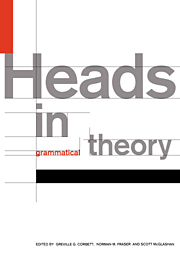Book contents
- Frontmatter
- Contents
- List of contributors
- 1 Introduction
- 2 The head of Russian numeral expressions
- 3 The phonology of heads in Haruai
- 4 Patterns of headedness
- 5 Head-hunting: on the trail of the nominal Janus
- 6 The headedness of noun phrases: slaying the nominal hydra
- 7 Head- versus dependent-marking: the case of the clause
- 8 Heads in discourse: structural versus functional centricity
- 9 Heads in Head-driven Phrase Structure Grammar
- 10 Heads and lexical semantics
- 11 Heads, parsing and word-order universals
- 12 Do we have heads in our minds?
- 13 Heads, bases and functors
- References
- Index
9 - Heads in Head-driven Phrase Structure Grammar
Published online by Cambridge University Press: 23 February 2010
- Frontmatter
- Contents
- List of contributors
- 1 Introduction
- 2 The head of Russian numeral expressions
- 3 The phonology of heads in Haruai
- 4 Patterns of headedness
- 5 Head-hunting: on the trail of the nominal Janus
- 6 The headedness of noun phrases: slaying the nominal hydra
- 7 Head- versus dependent-marking: the case of the clause
- 8 Heads in discourse: structural versus functional centricity
- 9 Heads in Head-driven Phrase Structure Grammar
- 10 Heads and lexical semantics
- 11 Heads, parsing and word-order universals
- 12 Do we have heads in our minds?
- 13 Heads, bases and functors
- References
- Index
Summary
Introduction
Head-driven Phrase Structure Grammar (HPSG) is the only current approach to syntax with ‘head’ in its title. Obviously, then, heads play an important role in the framework. As its founders, Pollard and Sag, stress, HPSG is also a unification-based approach (see Pollard and Sag, 1987). This means that whether or not an expression is well formed depends on a variety of factors, none of which takes precedence over any other. I will argue that there is a conflict between these two features of the framework. More precisely, I claim that a fully general characterization of the head-mother relation requires a default principle which is incompatible with a purely unification based approach (as in Pollard and Sag, 1987: 8). It seems to me that this is true within the standard version of HPSG, but it is particularly true if HPSG is revised in ways that I have argued for elsewhere (Borsley, 1987, forthcoming). A unification-based approach is not something that should be given up lightly, since it offers a simple picture of how grammars function and is attractive from a computational point of view. However, if it precludes the capturing of a linguistically significant generalization, it should be abandoned, and it seems to me that this is the case.
In a sense, this chapter is rather narrowly focused, since it is concerned with the correct formulation of one principle in one not very widely assumed framework. However, the argument that I develop is potentially relevant to any framework in which heads have mothers, any constituency-based framework, in other words.
- Type
- Chapter
- Information
- Heads in Grammatical Theory , pp. 186 - 203Publisher: Cambridge University PressPrint publication year: 1993
- 1
- Cited by



